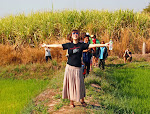The past week, the CIEE students met and exchanged with different speakers and organizations involved and affected by the issues of irrigation and mining projects, asking questions to gain knowledge through the person-to-person social research human perspective approach. Learning directly from the source of the affected groups or the groups behind the schemes CIEE students are able to get different sides of the story apart from what we could read in texts.
The first exchange involved the communities of Nongbualamphu and the villagers residing along Lampaniang River, those affected by the government initiated irrigation project. The project involved the dredging and widening of rivers, causing the rice fields to be dug up and farmers to loose farmland, vegetation, and buffalo, with out receiving any compensation. The CIEE students met with community leaders, members, and a local NGO, P’Suwit, exchanging information by inquiring the villagers about their view of the issue in which they responded problems of miscommunication between the government and the people and the lack of awareness and knowledge of Thai people. Currently, the villagers are waiting to hear the decision from the court case now in Bangkok, their compensation, and also the end of the river dredging project.

By mid-week, we were getting ready for exchanges taking a different side and perspective. Exchanging with representatives from Ministry of Primary Industry and mining showed a separation and difference in opinion between the representatives of the Ministry separately from the representatives’ personal viewpoints. The Ministry discussed mining regulations, Environmental Impact Assessments that are still needed to the completed to continue with mining projects and concessions, mining benefits and the public responses to mining, pro and con groups.

Exchanging Gifts at the Ministry of Mining - Photo by Jackie Fan
Shortly afterwards, the CIEE students exchanged with the Asia Pacific Potash Corporation’s (APPC) public relations manager, a senior geologist, and pro-mine villagers, discussing the positive purposes of the mine, such as creating an opportunity for extended incomes, jobs, other industries, especially development. The pro-mine villager believe the benefits of the mining project including compensation and development will aid the education sector of Thailand, enabling their children to study abroad and see the world. Going into the exchange knowing the costly effects of potash and mining projects, APPC provided geological and technical solutions of the harms on the environment and the assurance that APPC will not back down in the fight against the mining project. Yet the anti-mine villagers, participating in protests against the corporations, and refusing to talk to any party appear that they will not back down and have caused a hiatus in the completion of the project.
Wrapping up the week, students were divided into exchanges between multiple focus groups with villagers whom all opposed the mine for years, including core leaders of the Conservation Club, the Iron Ladies, and members of the Youth Conservation Club. These focus groups emerged in solidarity to form the People’s movements opposed to the development projects because of the long-term environmental effects, lost of livelihoods, and the fear of land subsidence. Meeting with the Youth Club was pleasant to see three teenage members interested in exchanging with us. As we learned about the history and process of the youth club group and their aspiration to follow their parents’ and the Conservation Club, we also gained their perspective of development. All of them saw the advantages and disadvantages, and yearned for development if it brought happiness to their community. They also only wanted “good” development in parts of their society in fear of useless and overwhelming development that results in losing their culture.
In our final exchange for the unit, we met with Mr. Suwit Gulabwong, the primary NGO serving as an advisor to the Conservation Club. He has been working and living in the community for about three years and helped to provide us with a large context of the issues in the area we were studying and also the challenges of globalization in Isaan and in general. He provided us with a lot of information about the grassroots approach of NGOs stressing on the movements in addition to the necessity for an organized, participatory, aware, and informed community or group to create change. This method of movement and its components practiced by the villagers has already halted the mining project in Udorn Thani. Mr Suwit left us all with thoughts on ways of contributing as global citizens to the issues in Thailand and also back home in our communities in the United States. There is a hope and the power of one and the benefit of more to help in understanding each other and actively learn.
Jackie Fan - University of Richmond


No comments:
Post a Comment